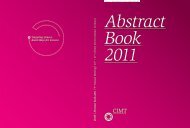Abstract Book 2010 - CIMT Annual Meeting
Abstract Book 2010 - CIMT Annual Meeting
Abstract Book 2010 - CIMT Annual Meeting
Create successful ePaper yourself
Turn your PDF publications into a flip-book with our unique Google optimized e-Paper software.
078 Maccalli | Tumor biology & interaction with the immune system<br />
Definition of the immunological properties of cancer stem cells<br />
isolated from human glioblastoma<br />
Cristina Maccalli 1 , Tiziano Di Tomaso 1 , Ena Wang 2 , Stefania Mazzoleni 3 , Gloria Sovena 1 ,<br />
Soldano Ferrone 4 , Rossella Galli 3 , Francesco M. Marincola 2 , Giorgio Parmiani 1<br />
1 Unit of Immuno-Biotherapy of Solid Tumors, San Raffaele Foundation Scientific Institute, Milan, Italy<br />
2 Department of Tranfusion Medicine, National Institutes of Health, Bethesda, MD, USA<br />
3 Neural Stem Cell Unit, San Raffaele Foundation Scientific Institute, Milan, Italy<br />
4 Hillman Cancer Center, University of Pittsburgh Cancer Institute, Pittsburgh, USA<br />
The main objectives of our study is to assess<br />
whether cancer stem cells (CSCs) isolated from glioblastoma<br />
multiforme (GBM) patients can be exploited<br />
as source of antigens to elicit T cell-mediated<br />
immune responses and their validation to design<br />
immunotherapeutic protocols for GBM. We have<br />
characterized, by immunofluorescence and cytofluorimetric<br />
or confocal microscopy analysis, the<br />
immune profile of 14 CSC and of 7 FBS tumor line<br />
pairs isolated from GBM samples. Moreover, PBMCs<br />
isolated from GBM patients were in vitro stimulated<br />
with autologous CSCs and the specific reactivity of<br />
T lymphocytes against GBM CSCs was evaluated by<br />
IFN-g, Granzyme B release (ELISPOT) or CD107a<br />
mobilization. We have assessed that both GBM CSC<br />
and their FBS-cultured non-CSC pairs showed a<br />
low immunogenic profile (MHC, NKG2DL and APM<br />
molecules). Up-regulation of most of these molecules<br />
was induced by IFNs or 5-Aza CdR, though<br />
more efficiently in FBS than in CSCs. Notably, T<br />
cell responses, both CD4+- and CD8+-mediated,<br />
against GBM could be raised in one GBM patient by<br />
stimulating in vitro PBMCs with autologous CSCs<br />
pre-treated with IFN-β. However, TH2-mediated<br />
responses with more efficient recognition of FBS<br />
tumor cell than CSCs, could be found in 3 additional<br />
GBM patients. One key finding of this study<br />
is that CSCs but not FBS cells inhibit allogeneic T<br />
cell proliferation. This immune-inhibitory activity<br />
mediated by GBM CSCs was not dependent on the<br />
secretion of TGFβ1 or 2, that were preferentially<br />
down-modulated in CSC lines, nor on IL-10 and<br />
IL1-3 that were undetectable in the supernatant of<br />
these cell lines. Expression of the indoleamine 2,3dioxygenase<br />
(IDO), a molecule implicated in the generation<br />
of immune tolerance, was detected in both<br />
CSCs and FBS tumor cell lines with high increase<br />
following IFN-g treatment of the cells. Furthermore,<br />
we found that both CSCs and FBS tumor cells<br />
expressed immune response inhibitory molecules,<br />
such as CTLA-4, PD-1 and PDL-1. Furthermore, a<br />
differential gene signature that was confirmed at<br />
the protein levels for some immunological-related<br />
molecules was also found between CSC and FBS<br />
lines. Moreover, this latter analysis provided information<br />
of some candidate molecules associated<br />
with CSCs that we are functionally investigating.<br />
Altogether, these results indicate a lower immunogenicity<br />
and higher suppressive activity of GBM<br />
CSC compared to autologous FBS lines and the need<br />
to identify immunomodulatory agents that can efficiently<br />
restore the expression of immunogenic molecules<br />
on CSCs.<br />
127



